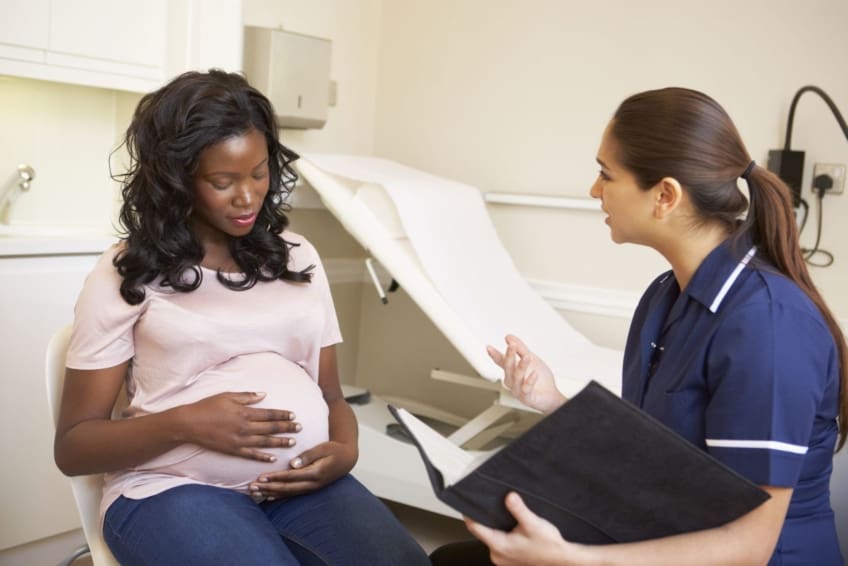
Pregnancy screenings can provide valuable information before your baby is born. For example, genetic screenings can determine your baby’s risk for certain birth defects. This includes Down syndrome, trisomy 18, spina bifida, or other birth defects.
Screenings do not provide a diagnosis. They cannot determine for certain that your baby has a birth defect. However, they can tell you whether your baby is at increased risk for the most common ones. If the risk is high, you may choose to do a diagnostic test. Sometimes diagnostic tests are more invasive, which is why screening is an important first step.
Most pregnancy screenings are in the form of a blood test. Your doctor may follow up with an ultrasound (a picture of the baby). Your doctor also will consider the mother’s age and ethnic background. They will consider other risk factors, such as a family history of a birth defect. This could mean that your baby is at higher risk for the same birth defect.
Path to improved health
Most prenatal screenings occur when you are 15-20 weeks pregnant. The primary screenings are optional, but all pregnant people are offered the tests. However, some choose not to do the screenings. There are three primary screenings that begin with a blood test: triple screen, quad screen, and penta screen. The blood tests look for different proteins in the blood.
- Triple screen: this test measures three substances in a pregnant person’s blood. These substances include alpha-fetoprotein (AFP), human chorionic gonadotropin (hCG), and unconjugated estriol.
- Quad screen: A quad screen measures four things in a pregnant person’s blood. This includes AFP, hCG, unconjugated estriol and inhibin A.
- Penta screen: A penta screen measures all of the above, plus the substance hyperglycosylated human chorionic gonadotropin.
- Cell-free DNA: this newer blood test can be performed after 10 weeks of pregnancy. This blood test may be more sensitive than the others. It collects DNA from the baby that is present in the mother’s bloodstream. It uses these DNA fragments to predict the baby’s risk for birth defects.
None of these blood screenings pose a risk to mom or baby. If you choose to do a screening, you and your doctor can decide which one is best for you.
Things to consider
If blood tests indicate your baby is at increased risk of a birth defect, your doctor will follow up with additional tests. These tests include:
- High-resolution ultrasound: This also called a level II ultrasound. It provides more detail about possible birth defects. It can check your baby’s age, brain, spinal cord, kidneys, and heart. It is usually completed between 18 and 22 weeks of your pregnancy.
- Chorionic Villus Sampling (CVS): This is an invasive test. Your doctor will collect a tiny piece of the placenta, called chorionic villus. It is checked for chromosomal or genetic disorders. A CVS test is offered to people who received an abnormal result on a first trimester screening test. Also, it is offered to people who could be at higher risk. It is completed between 10 and 12 weeks of pregnancy.
- Amniocentesis: This is an invasive test. Your doctor will collect a small amount of amniotic fluid from the area around the baby. It is tested for certain proteins. This can determine whether your baby has Down syndrome or other genetic problems. It is recommended for women who had an abnormal pregnancy screening blood test. It is completed between 15 and 18 weeks of pregnancy.
Most diagnostic tests are offered to people with higher risk pregnancies. This includes people who are 35 years of age or older, people who have had a previous pregnancy affected by a birth defect, people who have chronic diseases such as lupus, high blood pressure, diabetes, or epilepsy, or people who use certain medications.
If your doctor discovers a birth defect during the pregnancy or at birth, they may refer you to a genetic counselor. This is an expert who can explain the test results, order additional testing, and refer you to a doctor who specializes in high-risk pregnancy or genetic conditions.
Other considerations
- Pregnancy screenings are a personal choice. If your screening is abnormal (positive), do you want to take the next step? This would be a diagnostic test. Will it affect how you handle your pregnancy?
- Some screenings produce false-positives. This means your baby may not actually have a birth defect. A false-positive may or may not affect your choices for additional tests or cause stress. If a screening is normal, it can give you peace of mind.
Questions to ask your doctor
- If a pregnancy screening leads to an amniocentesis, is that procedure dangerous for my baby?
- Are most pregnancy screenings for older mothers?
- How long does it take to get the blood test results?
![]()
Copyright © American Academy of Family Physicians
This information provides a general overview and may not apply to everyone. Talk to your family doctor to find out if this information applies to you and to get more information on this subject.










